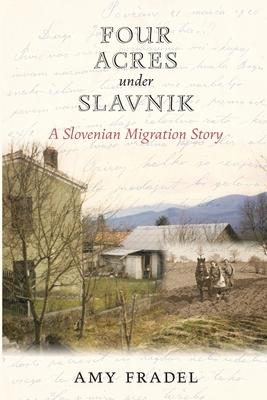Janez Fradel, a Slovenian soldier, deserted his post in the Austro-Hungarian Army in 1913. He went to West Virginia to cut trees, not knowing that he and his girlfriend, Marija Fabjančič, had conceived a child.
Four months later, Marija waved good bye to her beloved brother, Jozef, from the deck of a steamship in Trieste bound for New York. She imagined a happy return in two years with her husband, a child, and money enough to expand their four-acre farm in a valley under a mountain called Slavnik. The letters that crossed the ocean between them over the next 50 years reveal an intimate story of ordinary people whose lives were shaped by two world wars, economic upheaval, the challenges of life in a new country, and of survival under Italian oppression and a civil war in the old. Using family letters, oral history, and extensive historical research, Amy Fradel, recipient of the 2022 Slovenian Union of America Literary award, takes the reader on an epic journey through the little-known history of Primorska and its place in Slovenian and Yugoslav history.
At the time of their departures, Trieste was a lively multicultural city and the major port of the Austro-Hungarian Empire. Rising behind the city is the Karst plateau, a region called Primorska, populated by Slovenian people. In accordance with a deal made with Britain and France in 1915, Italy was given possession of Trieste, Primorska, and other Slavic lands along the Adriatic Sea at the conclusion of the First World War. Italy wanted to reclaim the lands of ancient Rome and cleanse them of the taint of Austrian and Slavic language and culture, a process that escalated to the removal of Slovenian people as Italy embraced fascism, and its leader, Mussolini, vowed to make Italy great again.
The story takes a deep dive into global issues surrounding immigration, racism, and the rise of authoritarian regimes that the world still grapples with today while it tells a captivating story of Primorskans who lived it. Four Acres under Slavnik is a well-researched work of nonfiction that serious historians and those interested in the real experiences of their immigrant ancestors will appreciate.
